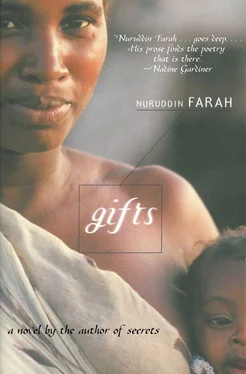Nuruddin Farah - Gifts
Здесь есть возможность читать онлайн «Nuruddin Farah - Gifts» весь текст электронной книги совершенно бесплатно (целиком полную версию без сокращений). В некоторых случаях можно слушать аудио, скачать через торрент в формате fb2 и присутствует краткое содержание. Год выпуска: 2011, Издательство: Arcade Publishing, Жанр: Современная проза, на английском языке. Описание произведения, (предисловие) а так же отзывы посетителей доступны на портале библиотеки ЛибКат.
- Название:Gifts
- Автор:
- Издательство:Arcade Publishing
- Жанр:
- Год:2011
- ISBN:нет данных
- Рейтинг книги:3 / 5. Голосов: 1
-
Избранное:Добавить в избранное
- Отзывы:
-
Ваша оценка:
- 60
- 1
- 2
- 3
- 4
- 5
Gifts: краткое содержание, описание и аннотация
Предлагаем к чтению аннотацию, описание, краткое содержание или предисловие (зависит от того, что написал сам автор книги «Gifts»). Если вы не нашли необходимую информацию о книге — напишите в комментариях, мы постараемся отыскать её.
Gifts — читать онлайн бесплатно полную книгу (весь текст) целиком
Ниже представлен текст книги, разбитый по страницам. Система сохранения места последней прочитанной страницы, позволяет с удобством читать онлайн бесплатно книгу «Gifts», без необходимости каждый раз заново искать на чём Вы остановились. Поставьте закладку, и сможете в любой момент перейти на страницу, на которой закончили чтение.
Интервал:
Закладка:
All the other errands struck her as very pedestrian, and it didn’t matter to her whether they were done by him or someone else. “Why telegraph New York?” She actually wanted to ask, “Telegraph whom in New York?” and suspected she knew the answer.
He was not good at lying, “I’ve just remembered it’s a friend’s birthday,” he said, but his eyes were shifty evasive.
“Why not postpone going out until we’ve had breakfast?” she said.
“Very well.”
With the towel dragging behind her, and not a stitch on, she walked past him on her way to the shower. Was she being provocative or just deliberately breaking the Islamic concept of cawra, whose primary function is to regulate female-induced chaos, imposing a taboo of ethics on the woman’s body? “See you downstairs,” she said.
Half an hour later, she joined him downstairs.
“Tea? Or would you prefer coffee?” he asked.
“Tea, please.”
He poured her tea into a china cup.
“How much sugar?”
“Two and a half spoons, please.”
Duniya now sensed Yussur’s presence more, given that she had died a tragic death. She wondered if the woman’s comb lent to her by Bosaaso had been Yussur’s and whether she had been disrespectful to Yussur’s memory by refusing to be shown round, shown the balcony from which her predecessor fell to her death. But he was selling the house, anyway, wasn’t he? People would suspect it was she who had encouraged him to sell it in an effort to start their life afresh, with no sad memories linking them to Yussur.
“How’s your omelette?” he asked.
He was a worrier, she decided.
“I can give you something else if you don’t like it.”
“It’s excellent, thanks,” she said.
He felt she wasn’t in a mood to talk.
“Could I have a little more sugar, please? For some reason I have a terribly sweet tooth today.”
“You don’t mind talking at breakfast, do you? Or do you prefer silence?”
She smiled. “I don’t mind either way, really. I’m just thinking.”
She looked about as they ate, asking herself if the kitchen they were in was wider than the main bedroom in which they had slept. To her the kitchen felt more spacious, and handsomely done up, with tiled walls, two ovens, one run on gas, the other on electricity, two refrigerators and a deep-freeze. Duniya guessed that the sun came in during the day crouching at one’s feet, which it tickled, like a favourite pet. At night, the moon shone in, preceded by particles of light, bright and shiny as gold. When the city power returned, the kitchen was the place in which light first came back. Such was the esteemed position a kitchen held in Bosaaso’s thoughts. It seemed to her that he had chosen its decor, leaving Yussur to do what she pleased with the rest of the house. Hence the ugly colours! Bedroom, curtains and all.
“May I share your worries, Duniya?” he said.
It occurred to her she was no longer comfortable with the names each had for the other. She wasn’t happy calling him Bosaaso, and Maxmoud lay heavy on her tongue, like yoghurt that has gone bad. She preferred that he choose his own abbreviation of her name. She thought all this as she chewed and then swallowed what she had in her mouth. “No worries to share, thank you,” she replied.
“What then?”
“I was just thinking about space and kitchens.” He appeared interested; she a little startled, because she didn’t know how Taariq’s favourite concept “space” slipped in. Cautious, she said, “About kitchens, let’s say.”
“I’ve chosen and seen to everything here, including the decor,” he said with pride.
“Why?”
He placed his knife and fork in the shape of a cross, making her think of the two pieces of straw Somalis lay across a milk-vessel, hoping this would discourage jinns from consuming it, or poisoning it for human consumption. He said, “In my mind kitchens are associated with my mother, not in any pejorative sense, but because in a world in which derogatory terms like Nigger, Woman and Native have become badges of honour, I believe that a woman like my mother afforded me the opportunity to take an appreciative look at the world. On returning home I thought, what better way to commemorate her than build a mausoleum of a kitchen in tribute to her? It was also with this in mind that I paid another tribute to my mother’s side of the family — Axmad, the taxi driver and the other cousins in the commune belong to my spindle side of the family, not my father’s. But this is neither here, nor there.”
“Surely, you didn’t grow up in a setting where space in the home is divided up into living, sleeping, eating and cooking spaces? So how can you think of a kitchen as a mausoleum?”
After a long while he said, “I would agree with you that men have assigned to themselves all the sacred, powerful spaces, forbidding women from being visible or present in such places as mosques or at meetings of a council of men reaching decisions which affect the whole community, including women.”
Duniya, agreeing, nodded her head.
“I also agree with you,” he said, following a thoughtful pause, “that the spaces allotted to women belong to the grey areas of beds, food and the rearing of children.”
Then the bell in the kitchen rang, just when they resumed eating their breakfast in reflective quietness. Bosaaso started. When it rang for the second time, he looked at Duniya for guidance. And when it rang for the third time, he looked up at the bell as if it were a video contraption that would show him on a ten-millimetre screen who wanted to enter.
There was anger in his eyes. But Duniya hoped he could decide whether to answer the bell or no without involving her in his affairs. Who could tell who it might be? Waaberi? Mire? Kaahin? One of Bosaaso’s numerous cousins? Or Nasiiba with an urgent message to surprise Duniya?
His mouth was twisted in a grimace.
“I hope that’s Waaberi,” he said, in the tone of a man itching for a fight.
They waited for the fourth ring of the bell.
“Did you hear people calling out your name last night?” she asked.
“I’m a heavy sleeper,” he reminded her.
The bell rang for the fourth time. He got up, a man quick to test his own strength against anyone. Leaving in haste, he dropped his napkin on the floor and Duniya bent down to pick it up.
She returned to her omelette and tea, in the quiet comfortable thought that she hadn’t pressed him either way. His life was his business and he could do what he pleased with it.
She heard the outside gate creak open and then heard it shut, admitting a woman whose thin voice was explaining to Bosaaso that she had come several times before, but had not found him in. “Where have you been all this time? I even went to that woman’s place this mornings, looking for you,” she said.
Bosaaso, voice neutral, said, “Why don’t you come inside?”
I am “that woman ,” thought Duniya, smiling.
Bosaaso preceded Waaberi into the kitchen. Duniya sized the woman up as she came in: small, large-mouthed and large-hipped, heavily made up and wearing lipstick, hair singed, dress expensive and belonging to the season’s fashion, with a zip in front, and showing enough of her enormous breasts, like a film preview, dark birthmark in the valley and all, bare arms, a bushy armpit, a belt with a pendant, a necklace of amber beads and bracelets for her wrists and anklets as well. Waaberi was so engrossed with thoughts about Bosaaso that she didn’t see Duniya who might have been part of the kitchen’s furniture. Then, pointing to Duniya, he said, “You know each other, don’t you?”
Not a sound from Waaberi. Only eyes filled with contempt. When next she had an interpretable expression, Duniya thought she might be considering the possibility of turning back whence she had come. But she struggled like a huntswoman caught in the trap she had set.
Читать дальшеИнтервал:
Закладка:
Похожие книги на «Gifts»
Представляем Вашему вниманию похожие книги на «Gifts» списком для выбора. Мы отобрали схожую по названию и смыслу литературу в надежде предоставить читателям больше вариантов отыскать новые, интересные, ещё непрочитанные произведения.
Обсуждение, отзывы о книге «Gifts» и просто собственные мнения читателей. Оставьте ваши комментарии, напишите, что Вы думаете о произведении, его смысле или главных героях. Укажите что конкретно понравилось, а что нет, и почему Вы так считаете.











